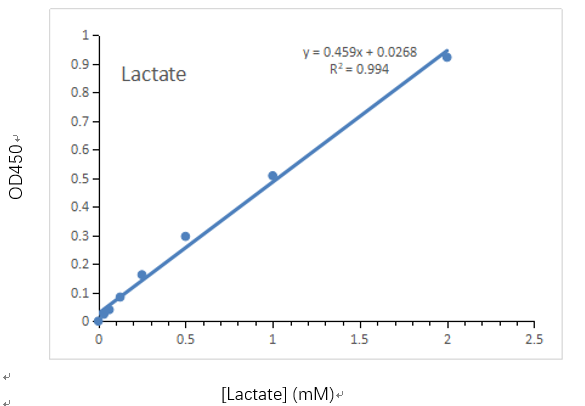Lactate
(CH3CH(OH)COO-) is a metabolic compound formed in animals by the action of the enzyme
lactate dehydrogenase. Lactate is produced in proliferating cells during
anaerobic conditions such as exercise. Abnormally high concentrations of
lactate have been related to pathological conditions such as cancer, diabetes,
and lactate acidosis.
L(+)-Lactate is the major lactate stereoisomer formed in human intermediary metabolism and is present in blood at levels of around 1-2 mmol/L. D(-)-Lactate can also be found in blood but only at about 1-5% of the concentration of L(+)-Lactate.

Lactic
acid is the end product of glycolysis in the body, which can be produced when
tissue hypoxia or pyruvic acid is not oxidized in time. Usually, the lactic
acid obtained from metabolism does not affect the acid-base balance in the
patient’s body. However, when the violent exercise reaches a high metabolic
state or shock, the anaerobic metabolism in the tissue increases significantly,
accelerating the production of lactic acid. The body’s ability to remove lactic
acid is gradually reduced, eventually leading to hyperlactacidemia, even lactic
acidosis. At this time, the blood lactate level test results showed a
significant increase. So the lactate
level can be used as an important indicator to reflect the balance of oxygen supply
and demand in critically ill patients.
Want a quick, quantitative determination of lactic acid? Abbkine CheKine™ Lactate assay kit will give you a good experience!
Abbkine CheKine™ Lactate Assay Kit provides a convenient means for detecting L-(+)-Lactate in biological samples such as in serum or plasma, cells, culture and fermentation media. In this kit lactate is oxidized by lactate dehydrogenase to generate a product which interacts with a tetrazolium salt WST-8 dye to form a colorimetric (450 nm) product, proportional to the lactate present.
| Product Name | CAT # | Detection Range |
| CheKine™ Lactate Assay Kit | KTB1100 | Detection Range |
【Kit components】
• Lactate
Assay Buffer
• Lactate
Dehydrogenase
• Lactate
Dehydrogenase Cofactor
•
WST-8
• Enhancer
•
L(+)-Lactate Standard (100 mM)
【Procedure】
- Prepare
the Working Reagent. - Add
diluted standard and sample per well, then add Working Reagent. Tap plate
to mix. Immediately read optical density at 450nm (OD0). - Incubate
for 30 min at 37°C in the dark. Read optical density at 450nm again (OD30).
【Standard Curve】

About Abbkine Scientific Co., Ltd.
Abbkine serves global scientists in the field of proteomics and cytology and is committed to the innovation and development of various scientific reagents related to proteomics and cytology, expecting to accelerate the pace of life science research and drug discovery. Proteomics products cover the preparation of samples (protein extraction, purification, coupling), protein quantification, antibodies and kits for protein detection. Cytology products involve cytokines (cell culture), cell status detection, cell staining, organelle extraction, cell metabolism and cytopathology reagents (kits). Abbkine relies on the product portfolio and unique marketing support as the main market strategy and product innovation mode, with ultimate aim to facilitate your research career.
Lactate
(CH3CH(OH)COO-) is a metabolic compound formed in animals by the action of the enzyme
lactate dehydrogenase. Lactate is produced in proliferating cells during
anaerobic conditions such as exercise. Abnormally high concentrations of
lactate have been related to pathological conditions such as cancer, diabetes,
and lactate acidosis.
L(+)-Lactate is the major lactate stereoisomer formed in human intermediary metabolism and is present in blood at levels of around 1-2 mmol/L. D(-)-Lactate can also be found in blood but only at about 1-5% of the concentration of L(+)-Lactate.

Lactic
acid is the end product of glycolysis in the body, which can be produced when
tissue hypoxia or pyruvic acid is not oxidized in time. Usually, the lactic
acid obtained from metabolism does not affect the acid-base balance in the
patient’s body. However, when the violent exercise reaches a high metabolic
state or shock, the anaerobic metabolism in the tissue increases significantly,
accelerating the production of lactic acid. The body’s ability to remove lactic
acid is gradually reduced, eventually leading to hyperlactacidemia, even lactic
acidosis. At this time, the blood lactate level test results showed a
significant increase. So the lactate
level can be used as an important indicator to reflect the balance of oxygen supply
and demand in critically ill patients.
Want a quick, quantitative determination of lactic acid? Abbkine CheKine™ Lactate assay kit will give you a good experience!
Abbkine CheKine™ Lactate Assay Kit provides a convenient means for detecting L-(+)-Lactate in biological samples such as in serum or plasma, cells, culture and fermentation media. In this kit lactate is oxidized by lactate dehydrogenase to generate a product which interacts with a tetrazolium salt WST-8 dye to form a colorimetric (450 nm) product, proportional to the lactate present.
| Product Name | CAT # | Detection Range |
| CheKine™ Lactate Assay Kit | KTB1100 | Detection Range |
【Kit components】
• Lactate
Assay Buffer
• Lactate
Dehydrogenase
• Lactate
Dehydrogenase Cofactor
•
WST-8
• Enhancer
•
L(+)-Lactate Standard (100 mM)
【Procedure】
- Prepare
the Working Reagent. - Add
diluted standard and sample per well, then add Working Reagent. Tap plate
to mix. Immediately read optical density at 450nm (OD0). - Incubate
for 30 min at 37°C in the dark. Read optical density at 450nm again (OD30).
【Standard Curve】

About Abbkine Scientific Co., Ltd.
Abbkine serves global scientists in the field of proteomics and cytology and is committed to the innovation and development of various scientific reagents related to proteomics and cytology, expecting to accelerate the pace of life science research and drug discovery. Proteomics products cover the preparation of samples (protein extraction, purification, coupling), protein quantification, antibodies and kits for protein detection. Cytology products involve cytokines (cell culture), cell status detection, cell staining, organelle extraction, cell metabolism and cytopathology reagents (kits). Abbkine relies on the product portfolio and unique marketing support as the main market strategy and product innovation mode, with ultimate aim to facilitate your research career.
